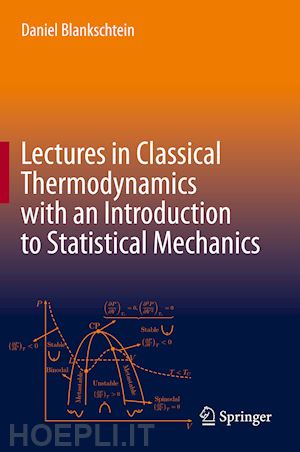
Questo prodotto usufruisce delle SPEDIZIONI GRATIS
selezionando l'opzione Corriere Veloce in fase di ordine.
Pagabile anche con Carta della cultura giovani e del merito, 18App Bonus Cultura e Carta del Docente
This textbook facilitates students’ ability to apply fundamental principles and concepts in classical thermodynamics to solve challenging problems relevant to industry and everyday life. It also introduces the reader to the fundamentals of statistical mechanics, including understanding how the microscopic properties of atoms and molecules, and their associated intermolecular interactions, can be accounted for to calculate various average properties of macroscopic systems. The author emphasizes application of the fundamental principles outlined above to the calculation of a variety of thermodynamic properties, to the estimation of conversion efficiencies for work production by heat interactions, and to the solution of practical thermodynamic problems related to the behavior of non-ideal pure fluids and fluid mixtures, including phase equilibria and chemical reaction equilibria. The book contains detailed solutions to many challenging sample problems in classical thermodynamics and statistical mechanics that will help the reader crystallize the material taught. Class-tested and perfected over 30 years of use by nine-time Best Teaching Award recipient Professor Daniel Blankschtein of the Department of Chemical Engineering at MIT, the book is ideal for students of Chemical and Mechanical Engineering, Chemistry, and Materials Science, who will benefit greatly from in-depth discussions and pedagogical explanations of key concepts.
Dr. Daniel Blankschtein is the Herman P. Meissner ’29 Professor of Chemical Engineering at the Massachusetts Institute of Technology (MIT). He received a Ph.D in Condensed Matter Physics in 1983 from Tel-Aviv University in Israel, and carried out postdoctoral studies in the Physics department at MIT before joining the Chemical Engineering faculty at MIT in 1986. He has published over 230 research articles in the general subjects of molecular-thermodynamic and statistical mechanics modeling of self-assembling surfactant systems, bioseparations using two-phase aqueous micellar and polymer systems, transdermal drug delivery using ultrasound and chemical enhancers, and modeling of wetting phenomena and liquid-phase exfoliation and stabilization of 2D nanomaterials using molecular dynamics (MD) simulations. He has received several awards, including a Presidential Young Investigator Award, the 1996 Ebert Prize from the American Pharmaceutical Association, the 2000 Dow Corning Award from the Controlled Release Society, the 2015 Capers and Marlon McDonald Award for Excellence in Mentoring and Advising, and nine Outstanding Faculty Awards for his teaching of graduate-level Thermodynamics.











Il sito utilizza cookie ed altri strumenti di tracciamento che raccolgono informazioni dal dispositivo dell’utente. Oltre ai cookie tecnici ed analitici aggregati, strettamente necessari per il funzionamento di questo sito web, previo consenso dell’utente possono essere installati cookie di profilazione e marketing e cookie dei social media. Cliccando su “Accetto tutti i cookie” saranno attivate tutte le categorie di cookie. Per accettare solo deterninate categorie di cookie, cliccare invece su “Impostazioni cookie”. Chiudendo il banner o continuando a navigare saranno installati solo cookie tecnici. Per maggiori dettagli, consultare la Cookie Policy.